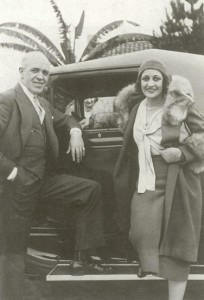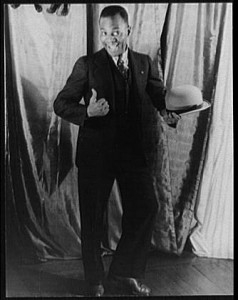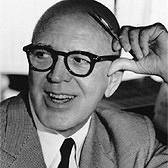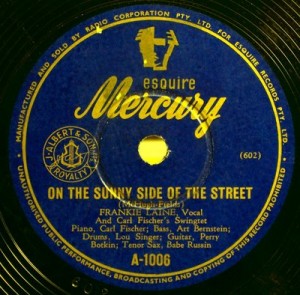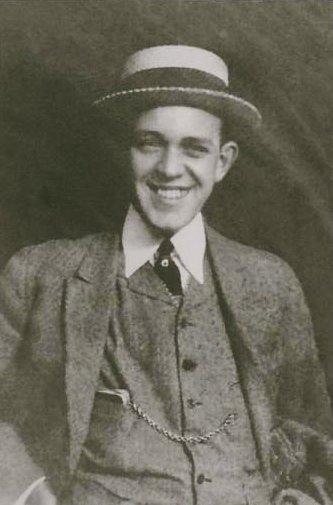
Jimmy McHugh in Boston during his song-plugging years. Photo from I Feel a Song Coming On, by Alyn Shipton.
A cocky go-getter from Irish Boston, Jimmy McHugh had the gift of gab and the charm to go with it. A top 'song-plugger' in the 1920s' sheet music industry, McHugh took promoting songs to a new level. He’d stay up half the night haunting nightclubs, stage doors, soda fountains, dance halls—anyplace with a piano and a crowd. Sitting at the piano, performing the newest songs of the day, McHugh was an irresistible one-man sales force.
Along the way Jimmy McHugh became a brilliant songwriter with dozens of his own hits. From the early 20s to the peak of his career in the 40s McHugh wrote more than 500 pieces of music and at least 10 percent were hits. He had big winners in Cotton Club revues, Broadway shows and Hollywood movies. There were smash hits like "I’m in the Mood for Love" and "Don’t Blame Me"—often heard on movie soundtracks and CDs recorded today.
Jimmy McHugh and his young songwriting partner Dorothy Fields became the toast of Broadway with their score for the New York stage show, Blackbirds of 1928. It was chock-full of their hits "Diga Diga Do," "I Must Have That Man," "I Can’t Give You Anything but Love" and "Doin’ the New Lowdown."
Bill 'Bojangles' Robinson got his big break in show business performing the Fields and McHugh number "Doin' the New Lowdown" in Blackbirds. Hired as an "extra attraction" for a late-night spot in the revue, Robinson sang "Doin' the New Low Down" while tapping up and down a spiral staircase. His stair-dance routine was a blockbuster success, hailed by critics, tripling weekly show revenues and making Robinson a star.
In this week's Riverwalk Jazz broadcast, tap master Savion Glover pays tribute to Bojangles' legendary performance with The Jim Cullum Jazz Band.
Jimmy McHugh had amassed a fortune by the end of the 1920s, writing hit songs for one Broadway show after another. He invested his new-found wealth and then, like everyone else, lost it all in the crash of the Great Depression. But McHugh discovered that he had at least one show business friend who would give him a hand—George Gershwin. In an archival interview McHugh recounts a Depression Era act of kindness from the great composer and colleague.
Jimmy McHugh is best known today for songs like "On the Sunny Side of the Street" composed with his long-time partner and friend, lyricist Dorothy Fields.
He taught her the ropes, composing scores for Harlem’s racy Cotton Club revues where Duke Ellington arranged and performed their music. Fields had an ear for street slang and catchy phrases, and McHugh’s melodies and harmonies were often novel and surprising. Together Fields and McHugh wrote popular standards like "I Can't Believe That You're In Love With Me" and "Exactly Like You," popular with jazz musicians as vehicles for their improvised soloing.
After Fields and McHugh went their separate ways McHugh collaborated with other great songwriting partners, mostly for Hollywood motion pictures—Johnny Mercer, Frank Loesser, Jerome Kern, Ted Koehler, Gus Kahn and Harold Adamson.
Jimmy McHugh's songs entered the jazz pantheon through recordings by Art Tatum, Benny Goodman, Billie Holiday and many, many more. Today McHugh's songs remain among the most popular jazz standards recorded by both mainstream and traditional jazz artists.
Photo credit for Home Page: McHugh and Dororthy Fields, Hollywood, 1930, from I Feel a Song Coming On, by Alyn Shipton.
Text based on Riverwalk Jazz script by Margaret Pick ©2011


